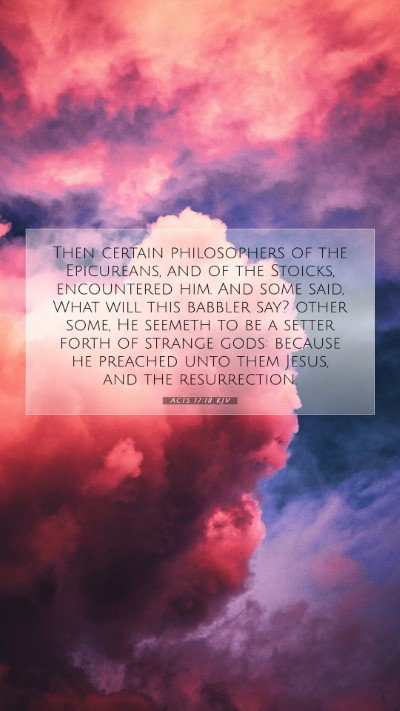Understanding Acts 17:18: A Comprehensive Bible Verse Commentary
Acts 17:18 states: "Then certain philosophers of the Epicureans, and of the Stoics, encountered him."
This verse presents an important moment in the Apostle Paul's missionary work. To fully grasp its
meaning, we shall explore insights from various public domain commentaries, notably those by
Matthew Henry, Albert Barnes, and Adam Clarke.
Historical Context
Understanding the context in which this verse was written is crucial. The Apostle Paul was on his second
missionary journey when he arrived in Athens. The cultural and philosophical milieu of Athens was dominated
by various schools of thought, primarily the Epicureans and Stoics. Each school held differing views on
the nature of the divine, human existence, and the pursuit of happiness.
Philosophies Encountered
- Epicureans: They believed in seeking pleasure as the highest good, which they equated with the
absence of pain and disturbance. Their gods were seen as indifferent to human affairs.
- Stoics: Conversely, Stoicism emphasized rationality and self-control, viewing virtue as
sufficient for happiness and believing in a divine reason (logos) that pervades the universe.
Bible Verse Interpretations
Different commentators offer a rich tapestry of insights regarding Acts 17:18.
Matthew Henry's Commentary
Matthew Henry elucidates that the encounter reflects the diverse intellectual landscape of Athens,
where Paul’s message was met with both curiosity and skepticism. He emphasizes that even in the face of
philosophical opposition, the gospel of Jesus Christ is relevant and compelling. Henry suggests that
this confrontation symbolized a broader struggle between divine truth and human wisdom.
Albert Barnes' Notes
Albert Barnes offers a more analytical perspective on the reaction of these philosophers. He highlights
that their engagement with Paul suggests a genuine interest in understanding new ideas, even if their
initial reaction was one of derision. Barnes interprets the phrase "encountered him" as indicative of
the philosophical debate—suggesting both engagement and challenge, characteristic of the academic
environment of the time.
Adam Clarke's Commentary
Adam Clarke expands on the significance of the philosophers' encounter with Paul. He points out that
this meeting signifies a crucial moment in the spread of the gospel, asserting that genuine dialogue
has the potential to bridge the gap between conflicting ideologies. Clarke’s analysis emphasizes that
while there may have been mockery ("He seemeth to be a setter forth of strange gods"), this also
underscores the transformative power of the Christian message in confronting worldly philosophies.
Application of Acts 17:18
For modern readers, Acts 17:18 encourages us to engage openly with diverse philosophical ideas while
standing firm in the truth of the gospel. As believers, we may face skepticism or ridicule when presenting
our faith, much like Paul did. This verse teaches the importance of dialogue in sharing biblical truths,
allowing for deeper connections with those who hold differing views.
Key Takeaways
- The encounter with philosophers highlights the intellectual challenges faced by the early church.
- Engagement in respectful dialogue opens pathways to communicate the gospel effectively.
- People today continue to seek meaning and understanding, reflecting a similar quest for truth seen in the philosophers.
Related Bible Cross References
- 1 Corinthians 1:20: "Where is the wise? Where is the scribe? Where is the disputer of this world?"
- Colossians 2:8: "Beware lest any man spoil you through philosophy and vain deceit."
- Acts 17:22-23: Paul's discourse with the Athenian philosophers elaborates further on the themes raised in verse 18.
Conclusion
Acts 17:18 encapsulates a moment of philosophical engagement that serves as a reminder of the relevance of
the gospel amidst competing worldviews. Through a combination of biblical exegesis and theological insights,
we can appreciate the intricate dance between faith and reason, as well as the encouragement to seek
understanding in scripture and engage others meaningfully.
Further Bible Study Insights
To enhance your understanding of scripture, consider utilizing various Bible study tools
and Bible study resources. You can join Bible study groups, participate in
online Bible study, or explore Bible study guides for deeper insights into
challenging biblical passages and their applications today.


